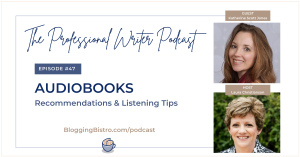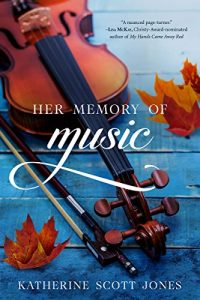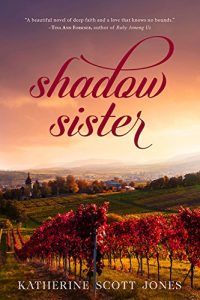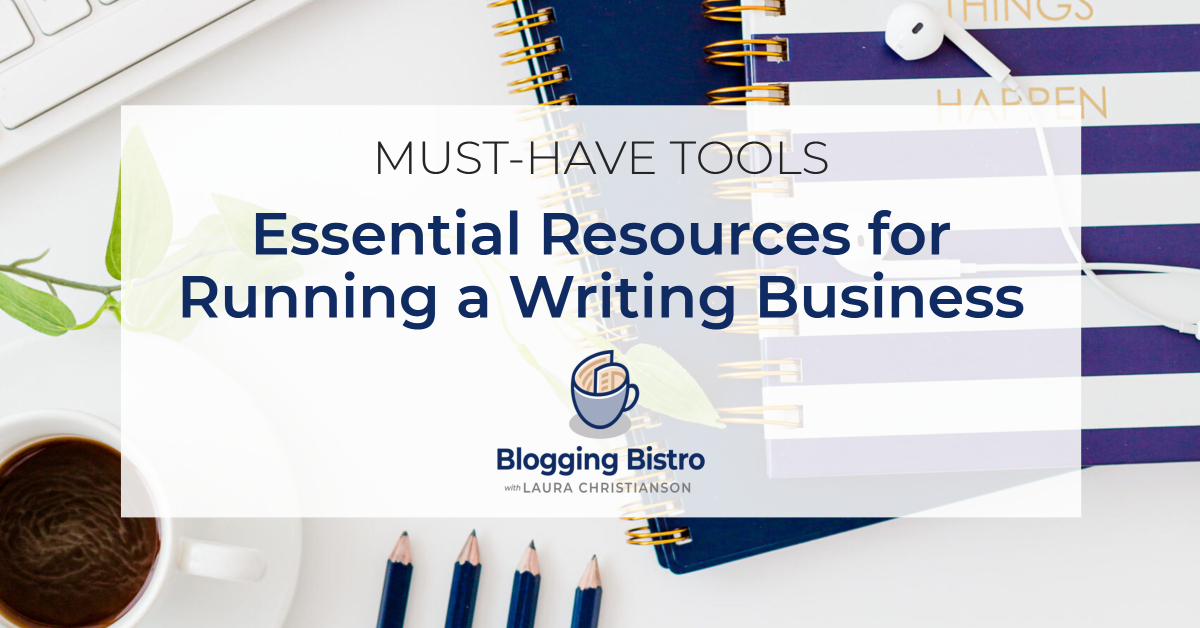47 – Audiobook Recommendations and Listening Tips, With Katherine Scott Jones
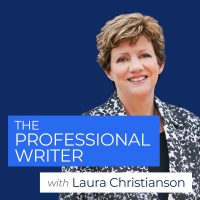
I’ll admit it; I’m an audiobook skeptic. I’ve listened to a few, but I either find them sleep-inducing, or I get so involved in the narration that I listen… and listen… and listen… and nothing else gets accomplished all day long!
Enter today’s podcast guest, Katherine Scott Jones. A book enthusiast, book reviewer, and author, Katherine challenges skeptics like me to “claim a growth mindset” and give audiobooks a shot (or another shot, in my case).
I loved chatting with Katherine – and you are going to love listening – for several reasons:
- She offers great tips for choosing a narrator and for keeping our brain engaged while listening.
- She introduces free and low-cost ways to get started with audiobooks, as well as ways to discover books to listen to.
- She gives us permission to abandon books we’re not enjoying.
- She explains how listening to audiobooks can benefit and hurt writers.
- She recommends 17 audiobooks in the genres of historical non-fiction, memoir, and fiction!
Katherine’s Audiobook Picks
Listen to the episode or read the transcript for Katherine’s thoughts about each of the following audiobooks.
Scroll to the bottom of the page for a transcript of this episode.
Historical Non-Fiction
The Boys in the Boat: Nine Americans and their Epic Quest for Gold at the 1935 Berlin Olympics, by Daniel James Brown. Narrated by Edward Herrmann
The Radium Girls: The Dark Story of America’s Shining Women, by Kate Moore
Fall and Rise: The Story of 9/11, by Mitchell Zuckoff
Forty Autumns: A Family’s Story of Courage and Survival on Both Sides of the Berlin Wall, by Nina Willner
Memoir
As You Wish: Inconceivable Tales from the Making of the Princess Bride, by Cary Elwes. Narrated by Cary Elwes himself (Westley)
Summer at Tiffany, by Marjorie Hart
Who Thought This Was a Good Idea?: And Other Questions You Should Have Answers to When You Work in the White House, by Alyssa Mastromonaco
My Southern Journey: True Stories from the Heart of the South, by Rick Bragg
The Office: The Untold Story of the Greatest Sitcom of the 2000s: an Oral History, by Andy Greene
Fiction
The Jane Austen Society: A Novel, by Natalie Jenner. Narrated by Richard Armitage
Larkspur Cove, by Lisa Wingate
The Mother-in-Law: A Novel, by Sally Hepworth
These Is My Words: The Diary of Sarah Agnes Prine, 1881-1901, by Nancy E. Turner
Agatha Christie:
Narrated by Hugh Fraser: Towards Zero
Narrated by Emilia Fox: Nemesis, Sleeping Murder
Narrated by Dan Stevens: And Then There Were None
The links above are affiliate links. When you make a purchase, Laura receives a commission, which helps support The Professional Writer podcast. Thank you!
About Katherine Scott Jones
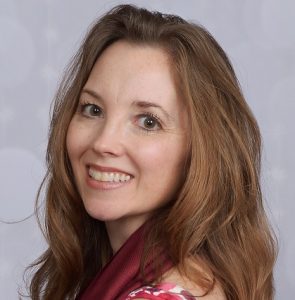 Katherine is a book enthusiast and an author who writes inspirational women’s fiction with a global accent. She writes for women who love stories about real-to-life relationships, people, and places.
Katherine is a book enthusiast and an author who writes inspirational women’s fiction with a global accent. She writes for women who love stories about real-to-life relationships, people, and places.
Her stories show God’s hand in tending to intricate matters of the heart as well as complicated matters of the world. They are books that celebrate beauty in the midst of brokenness.
Katherine grew up in coastal cities and overseas as her family moved with her father’s Navy career. She now lives in Seattle with her husband and their two teenage children.
After graduating from Whitworth University with a degree in communications, she freelanced to magazines before turning her hand to fiction.
Katherine is the author of Her Memory of Music and Shadow Sister.
She loves black coffee, bold wine, world travel, BBC dramas, and morning walks with her husband. When not ensconced in her writing chair, she might be found training for an occasional 10k, planning the next family trip, or researching her family tree.
Find her at katherinescottjones.com
How to Keep Up With the Show
Click here to join my my email list and I’ll notify you about every episode. (When you subscribe, you’ll also get my free guide, Essential Resources for Running a Writing Business.)
Join The Professional Writer Podcast Community (private Facebook group), where we discuss what we’re learning, meet our guests, and encourage one another on our writing journeys.
If you know a writer who would be interested in The Professional Writer Podcast, please share this link with them:
https://bloggingbistro.com/podcast
Thank you!
Laura
Read the Transcript
Episode 47 - Audiobook Recommendations and Listening Tips, With Katherine Scott JonesLaura: I am super excited today to welcome one of my longtime friends, Katherine Scott Jones.
Katherine: Good morning, Laura. So nice to be here today.
Laura: I am trying to remember back when we first met. We were both members of an organization called Northwest Christian Writers Association, both very involved in that organization. We met almost 15 or 20 years ago. You were a baby writer then. And now you’re an experienced author. Multi-published, massive blogger, awesome all-around person.
Just a little bit of information about Katherine. She’s a book enthusiast, and we’re going to talk a lot about that today. She’s an author who writes inspirational women’s fiction with a global accent. Now what do you mean, Katherine, by the global accent?
Katherine: Well, that’s one of my favorite parts. They’re predominantly sat somewhere in the US. Mine so far have been set right here in our corner of the country in the Pacific Northwest. That’s the main setting. But I try to have a part of it that takes place in another part of the world. And what I’m trying to show there is how we as women, we as people are all tied in together. And what we experience here in our lives is connected to what other women and people experience elsewhere.
Laura: Thank you for that explanation. One of the things you say on your website about your books is that their books that celebrate beauty in the midst of brokenness. I love that. That’s a very nice, succinct way of putting it. Katherine, you and I also share our love of coffee. And you like bold wine, world travel, BBC dramas and morning walks with your husband. And when not ensconced in your writing chair, like both of us are, currently you might be found training for the occasional 10k, planning the next family trip or researching your family tree. So you’re a multitalented.
Katherine: Thank you. I’ve got a lot of many fingers in many pies right now.
Laura: Today Katherine and I are going to be talking about audio books. I’ve been so much looking forward to recording this episode because I have listened to a few audio books, but not very many. And so I’m a little bit of a skeptic when it comes to audiobooks.
I’m one of those people are like, Oh; it takes so much time to listen to them. And I’ve noticed that when I do start listening to an audiobook that everything else that’s on my plate of things to do that day just kind of goes out the window. And I ended up not being very productive at all, because I’m into the audio book that I want to listen to the whole thing. So I’m counting on you, Katherine to do a little bit of educating and maybe some stern talking to me today about audio books. You are talking with us today from the perspective of a book reviewer because you do review a lot of books and Katherine is going to be back with us for another episode where we talk specifically about her job as a book reviewer. So you are approaching audio books from the perspective of a book reviewer, as well as from the perspective of an avid audiobook listener and somebody who does a lot of reading of print books as well as listening to audio books.
Katherine: That is correct. I’m also going to be talking from the perspective of a writer because I think that audio books are a tool that perhaps many writers don’t take into account.
Laura: Good point, yes, and so audio books are huge right now. They’re really burgeoning in the publishing industry in general and so as a writer or an author who is looking to get a book in print, considering having an audio book version of our book would be really. So I’m happy you’re going to be talking about that as well.
My first question for you, Katherine, is what got you into audio books in the first place?
Katherine: Well, I’ve always been an avid reader. I always have a novel and at least one nonfiction in progress. The fiction is for entertainment and the nonfiction for enrichment I’m a visual learner, and I did not think the audio would appeal to me.
In the past several years, I had given one or two a try, and I liked it. Okay, But it didn’t grab me. I was, I think, pretty much in the camp where you are right now. It was all right, but it didn’t compel me to change my reading habit until I discovered that the particulars matter.
- The narrator of the book.
- The speed at which I listen.
Those were game-changers. But I discovered these things when I listened to one book and that book was The Boys in the Boat. This was not my first audio book, but it was the first one that captured me and hooked me for more. I think it’s interesting that this was not a book that I would have devoted myself to reading in print. But when I started it on audio, I could hardly put it down. And now I often use my audio time to fill in the gaps of what I don’t have time to devote to imprint reading. And today I read at least as many books on audio as I do in print.
Laura: When you read The Boys in the Boat, what was it about the audio version of it that just captured you?
Katherine: The narrator was superb He was Edward Herrmann. He did a fantastic job in narrating this voice, and unfortunately, he’s no longer with us. But he had a real gift for it. Also, the book itself was so well written and the scope of it was incredible. The combination of those two things drew me right in. The way he unfolded his story made me care.
Laura: You mentioned a minute ago that you’re a visual learner. And so you were a bit of a skeptic in getting started listening to audio books because of that. I’m the same way, Katherine, and I think a lot of us who are writers are very much visual learners. And auditory is a little bit of a challenge for us.
If we were interested in giving this a shot, we haven’t really listened to any or very few audio books, what tips do you have for us to help us get started?
Katherine: I would keep it free or really cheap. So then you’re not feeling compelled to stick with a book that you are not enjoying. 99% of the books that I listen to are free and I get from my local library. I listened to them on an app that I have on my phone for my library, and I think that most libraries, it’s either Overdrive or Libby.
Laura: I’ve never quite understood the difference between Libby and Overdrive. I have both of them installed on my devices and they seem to overlap.
Katherine: I have had people say that they loved Libby, could not get the hang of Overdrive. I personally prefer Overdrive. I’ve tried them both, and I stick with Overdrive. I would recommend that readers install them both, see which one they prefer, but that is how you can key into your library systems. Vast, vast library of audio books for free.
Laura: You install either Overdrive or Libby on your phone or your device, whatever device you’re going to be listening from. I use a Kindle Fire, so I have that installed on my Kindle and then you go to your library, you check out the audio book version of a book, and then you download it to the app. When you’re at your library, it’ll walk you through the steps of how to download it to your device.
Katherine: Another source for cheap books. So not free, but very inexpensive is if you receive notifications for ebook sales. There are a number of clearing houses that you can sign up for, like bookbub.
My second suggestion is keep it quick, and that means up the speed. Any device that you’re listening on, any app is going to give you the ability to increase your listening speed. You can listen to it at normal speed. And then there’s at 1.25 speed, 1.5 speed, 1.75 and twice the normal speed. I routinely listen to things on 1.25 and occasionally I will adjust it up to 1.75. And that makes all the difference because we listen, of course, faster than we speak, and we read on paper faster than we listen and that helps our brains to keep engaged. I think that a lot of audiobook listeners who don’t get engaged don’t realize they have that option.
Laura: Oh, I like that tip, Katherine, because typically, when I listen to a talk show or an audiobook, I listen late at night and it puts me to sleep, and that’s when it’s at the regular level. But if I up the speed to 1.25 or 1.5, well, eventually they start sounding like the Chipmunks. I don’t want that. I have noticed that a lot of the narrators for audio books tend to read quite slowly and distinctly because they’re pronouncing each word clearly and so upping the listening speed really is a good experience.
How about tip number three?
Katherine: Be super choosy. Give yourself permission to abandon books that you begin. If you are not enjoying a book, put it down. This frees you to listen to all the books that you love. That is also just one of the key things is to let yourself be choosy.
Laura: That’s another really good tip, Katherine. I’m an avid reader. I read probably 120 books per year just for fun. I have been training myself in the last year or two to abandon books… Abandon ship! If the book isn’t really appealing to me because there are so many books out there that I know really will appeal to me that I don’t need to waste my time feeling guilty because I don’t finish a book that I’ve started.
Katherine: And there are so many factors in that. If the narrator is not right… if it’s not the right kind of book. For example, I have discovered that how-to books for me personally don’t translate well to audio. I’m wanting to make notes and underline things in the book, and you can’t do that on audio.
The narrator can make or break a book, and it is just so important that you love the narrator. In the past week, I have probably abandoned four audio books, and the one I’m on right now is still on probation because I’m now an experienced audiobook listener. I probably know within two minutes whether a narrator is going to work for me. Sometimes it takes me longer to know whether I’m going to like the book. Both those pieces for an audio book are equally important. Both the book and the narrator matter.
Laura: You know what? I think you’re realist. I create websites for a living for many authors and other entrepreneurs. I always tell my clients that you have two seconds to capture the interest of someone who is has landed on your website and who may be randomly scrolling through the home page or whatever page they happen to land on.
You have two seconds. Websites are very much short-form writing. And books, as we know, are long-form writing. You are giving a book the equivalent of the website two-second overview, where you’re listening to an audiobook for around two minutes and making your decision. That that is a word to the wise for authors, as you are deciding who, if you have the decision-making capability of who will be narrating the audio book version of your book and just how picky many of your listeners will be in putting your book on probation for a couple of minutes and then deciding whether they want to continue listening.
Would it be true for you, Katherine, that if you abandon an audio book, do you ever go back and read the print version or the Kindle version?
Katherine: Yeah, if I’m abandoning because of the narrator again with the audio book in that format these are two independent factors, the author many times cannot control the narrator.
Whoever the publisher gets to narrate their book, they have no control over that. Depending on the book, I would definitely consider picking it up in print form if I felt that the book was right for me, just not the narrator.
Laura: How about authors and writers? How can listening to books benefit you if you are a writer?
Katherine: Listening to audiobooks is a great way to reclaim some of those little cracks and crevices of time that we need for research and for learning about whatever were writing about. Plus, every writer knows that the best way to improve your craft is to read a lot, both inside and outside your genre, and audio books provide an amazingly efficient way to do that. I am listening to audio books when I am driving, you know, chauffeuring, choring. I’ve never enjoyed cooking, cleaning and folding laundry more than I have since I got hooked on audiobooks.
With this also comes a caveat that we need to take care as writers that we are mindful of over-consumption. As writers, we need silence and we need mental white space. So it’s easy to kind of flip from being a non-audiobook person to being addicted to audiobooks. And that’s not a space that you want to find yourself in, either. You need to have space in your brain to be working out what you’re writing on, and not filling it with another voice all the time.
Laura: I see those addictive tendencies in myself, which might be one of the reasons why I haven’t spent a whole lot of time listening to audio books because I realized yes, I do need the mental white space in my day to let my brain decompress from all the myriad things that are going on in it.
How about figuring out which types of e books to listen to?
Katherine: I follow several writers online I follow their blogs, and often they are recommending books, and I will often look at a book and I wonder if it might be good on audiobook. So oftentimes, if I get a book recommendation now, the first place I go is to my library to see if they have it on audio. If they do, I get on the wait list or check it out or whatever. You can also go to bookbub.com. They do daily emails with cheap eBooks. That’s another good way of keeping in front of you what books are out there and that is a way to pick up a cheap audiobook sometimes, because sometimes if you decide to buy an inexpensive ebook, you can get the audio added to it for just a few dollars more.
Following authors and readers that you trust on Goodreads is another way to pick up good book recommendations.
Laura: One of the great places that I find a lot of books that I want to read and or listen to are from your recommendations on your website, and you are at katherinescottjones.com. Katherine has an amazing blog where she regularly reviews all sorts of different books, and I really respect your reading recommendations. In fact, there was one that you recommended last week that I put on hold at the library immediately and it just got delivered to my Kindle the other day.
Speaking of recommendations, can you give us some of your picks?
Katherine: I listen to historical nonfiction, memoir and fiction.
Historical Nonfiction
(Note from Laura to transcript readers: Links to each of the following books are in the show notes, above.)
Starting with the historical nonfiction I’ll begin with The Boys in the Boat, the book that turned audio books around for me. The complete title is The Boys in the Boat: Nine Americans and their Epic Quest for Gold at the 1935 Berlin Olympics, by Daniel James Brown. Narrated by Edward Herrmann. As I mentioned earlier, it’s narrated by Edward Herrmann, and I found it breathtaking in its scope. I was completely entranced. It is quite a long book.
The second book in this category, I would recommend, is The Radium Girls: The Dark Story of America’s Shining Women, by Kate Moore. This is a story about following the Curries’ discovery of radium. Radium found its way into mainstream products, and from there that became an entangled tale of opportunism, corruption and scandal. And this is the story of the battle for workers’ rights that still resonates today.
The third book in this category, I would recommend, is Fall and Rise: The Story of 9/11, by Mitchell Zuckoff. This book is a really long one. It’s the story of 9-11, and it helped me to grieve the events of 9-11 two decades later. It was meticulously researched. It was masterfully written, heartbreaking, powerful (as hard as it was to listen to). It felt to me like a way to honor both the fallen and the heroes. And of course, they were often one and the same.
The last one in this category is Forty Autumns: A Family’s Story of Courage and Survival on Both Sides of the Berlin Wall, by Nina Willner. This falls into the category of stories of human resilience and resourcefulness. I found it surprisingly and engagingly told,
Memoir
These memoirs I’m recommending tend to be lighter. Those are all fairly heavy, the narrative nonfiction there. So the first one of the memoirs that I would recommend is, As You Wish: Inconceivable Tales from the Making of the Princess Bride, by Cary Elwes. I’m not even particularly a fan of The Princess Bride. I mean, I like it, but I’m you know, I’m not a groupie, and I found this book utterly charming. His take on things is so positive, and it’s delightfully narrated by Cary Elwes himself, who was Westley.
Summer at Tiffany, by Marjorie Hart, is a true story of a couple of college girls from Iowa who miraculously land summer jobs at Tiffany and Company in New York City, becoming the first woman to work the sales floor right toward the end of World War II. It’s a little bit of celebrity dishing and a little bit on the celebration of VJ Day and Times Square. It’s wholesome and it’s a peephole into another era. It was again, just enjoyable.
Another one in this category I would recommend, is Who Thought This Was a Good Idea? And Other Questions You Should Have Answers to When You Work in the White House, by Alyssa Mastromonaco. This is a behind-the-scenes political memoir narrated by the author, who was the deputy chief of staff to President Obama. It was smart, funny, surprising and, as you might guess, a little bit edgy.
I do need to put in a something of a disclaimer that I always encourage readers to do a little bit of research themselves to know if a book is going to be right for them and not just go off one person’s say-so.
The next recommendation I have in the memoir category is My Southern Journey: True Stories from the Heart of the South, by Rick Bragg. This book I found just full of wisdom and humor. It was a grace-filled love letter to the American South in all of its imperfection and beauty. Now this one is read by the author, Rick Bragg, who is a Southerner and speaks like one. And so this is an excellent candidate, this audio book, for the increased speed to listen. I would also recommend that any potential readers give this one a little bit of time. I gave this one a longer probation period than I would normally because it did come to me highly recommended, and I was really glad I did. It does get off to a bit of a slow start. But once I was into his style of storytelling, I was completely hooked. I just found it a delight.
Laura: You can’t go wrong with Rick Bragg’s books. He is an amazing writer.
Katherine: Yes, he is an amazing writer. The last one in this category is The Office: The Untold Story of the Greatest Sitcom of the 2000s: an Oral History, by Andy Greene. I have enjoyed The Office. I would not call my call myself a fan, particularly, but I thoroughly enjoyed this audiobook. It is a must-read or must-listen-to for anyone who’s ever watched The Office and is familiar with the goings on there. And it’s really excellent on audio. But I do have to give one heads up. There’s language, just reader beware.
Fiction
Laura: You’ve walked us through some of your narrative nonfiction picks. You’ve given us some memoir picks and now you’re going to give us some fiction picks.
Katherine: I tried to select a few that were of a variety The first one on my list is The Jane Austen Society, by Natalie Jenner.
This is a historical fiction set right after World War II. It is an ensemble cast, so to speak. One narrator but many different characters in a small English village. I found this to have a surprising gravitas and depth of characters. I was not expecting that for something that has Jane Austen in the title.
Laura: Oh, come on, Katherine! I have to tell you, I just read that book. I did not listen to the audio book version, but I’m thinking maybe I should go back and listen to the audio version because I didn’t like the print version all that well. I thought it was okay, but not great. What happened after I finished reading the Jane Austen Society — and I just finished a few days ago — I went on this Jane Austen binge. I’m like, Okay, I need to go back and re-read all my Jane Austen books. And, of course, I have all of them in paperback, hardback and ebook version, so I’ll have to get the audio book versions. So I went back, and I read Jane’s – see, I even refer to her by her first name. We know each other so well, even though she lived what, 200 years ago? I read her very first novel that she wrote that was never published because it was an early work and she wasn’t really fond of it. It was called Lady Susan. And after reading it, I can understand why, but, hey, we all have to start somewhere, right? And she wrote it when she was a teenager.
We went off on a little tangent there, but I had to stand up for my favorite author! So, back to The Jane Austen Society.
Katherine: I really enjoyed that on audio. It is narrated by the actor Richard Armitage, and perhaps that’s what makes the audio version.
So the next one in fiction that I would recommend is Larkspur Cove, by Lisa Wingate. Lisa Wingate is very prolific. It’s an inspirational contemporary romance set in small town Texas. I found it a particularly skillful weaving of faith-based themes and character growth. As a writer, I was especially impressed. This is one of the few books I’ve listened to that I liked the dual narration. Usually I prefer just one narrator. But in this instance there was a male and a female narrator, and it worked. I just really enjoyed how she pulled that whole thing together.
The next one on my list is The Mother-in-Law, by Sally Hepworth. This is set in suburban Australia, and it’s the kind of women’s fiction I enjoy with relationships and emotional complexity. I found this story to be very unexpected. It did not go where I thought it would, and I found it surprisingly satisfying.
Then a totally different type is These Is My Words: The Diary of Sarah Agnes Prine, 1881-1901, by Nancy E. Turner. That’s quite a mouthful of a title, but this is a pioneer adventure based on the author’s own family memoirs. It’s authentic in its detail. It’s heartbreaking at times, but I really appreciated its recognition of the brokenness of our world, especially in that pioneering world. But it had a real celebration of what is beautiful. And it is, at its heart, a love story.
I mentioned this book in part because this was an exception to my rule about the narrator. The narrator of this one bothered me at first, but I was so hooked on the story itself, I gave the narrator a little bit more of a try, and eventually either she adjusted with the story or I got used to it. But the narrator stopped bothering me, and I was so drawn into the story when I listened to it on audio and liked it so much I bought a print copy to have for my shelf.
Lastly, I’m kind of cheating here. This isn’t one book. I’m going to recommend an author, and again this is my personal taste. It may not be to everyone’s but I love Agatha Christie on audio, and I love very specific narrators, and I have to emphasize this because I have tried listening to other narrators that have not done it for me at all.
And so whether my picks float your boat, my point is, I would I would listen to the narrators that you enjoy. The narrators that I enjoy and that I would recommend for Agatha Christie are Hugh Fraser. He does the Hercule Poirot books and particularly I would recommend Towards Zero.
Emilia Fox does the Miss Marple books. And of those I would recommend Nemesis and Sleeping Murder.
Dan Stevens narrates stand-alones or ones that don’t have a particular detective. My favorite of his is And Then There Were None.
I’m assuming that these books need no introduction. They are classic British mysteries. I like these because they serve as palate cleansers. Often, they’re only about eight hours long. And they’re entertaining and they’re always well done. Sometimes, you just need something to fill in the gaps until you decide what you really want.
Laura: Oh, this is wonderful, Katherine. I am sitting here and I have this giant grin on my face because I think I’ve only read one out of all the books that you just mentioned. And if I’m going to give audiobook listening a try, I now have enough books to get me through a full year of listening. And as I mentioned earlier, we will put the links toe all of the books that Katherine has just introduced us to in the show notes, so that you can buy them or check them out from the library in either print or audio version or ebook version, or all of the above.
“Give these books a try” is what I’m hearing you say over and over. And for you, the person who is narrating the book makes a huge difference in your overall enjoyment of the book.
Katherine: Oh, it’s a deal-breaker. It is a deal-breaker or a deal-maker either way, and I cannot emphasize that enough. You love the narrator and give yourself permission to not like a narrator and to go on to the next one because there are some wonderful ones out there.
And once you find narrators that you love, you can do searches and find out what else they narrate. That can give you another avenue into audiobooks.
Laura: I also hear you saying that your recommendations for narrators and for books that you have enjoyed reading aren’t necessarily going to be the same ones that I will enjoy or that someone who’s listening to the podcast might enjoy. So find something, listener, that you particularly enjoy listening to.
Any other thoughts to leave us with concerning audiobooks?
Katherine: I would just really challenge those like you, Laura. I was right in your shoes myself, where I was an audiobook skeptic, and I would challenge those who are in that camp. Those who think that audio books are not for you. I challenge you to claim a growth mindset and not get stuck in a fixed one. I really think that you might see surprise yourself and grow yourself, both as a reader and as a writer, by exposing yourself to the world of audio books. Which, as you noted, is expanding like crazy right now. And there’s just going to be more to choose from as we go forward.
Laura: Thank you for that challenge. I’m always making a similar challenge to my listeners to have that growth mindset — that lifelong learner mindset. So I am listening to you, Katherine, and I’m going to listen to my own words that I preached as well and give audiobooks a shot.
I feel that I may just fall in love with them. Based on a few of the recommendations that I heard you making here today, I’m anxious to give those a shot.
Thank you so much, Katherine, for being a guest today on The Professional Writer podcast. If we want to read some of your book reviews and follow you, you do have an email that you send out regularly. Where can we get more information about you?
Katherine: That can be found at katherinescottjones.com.

